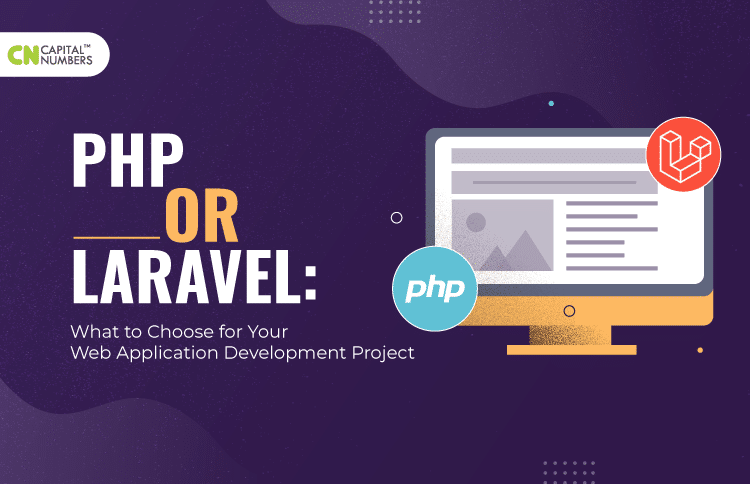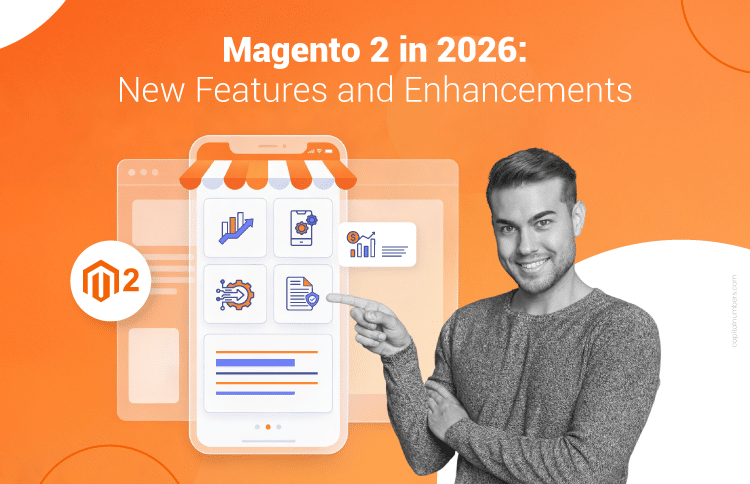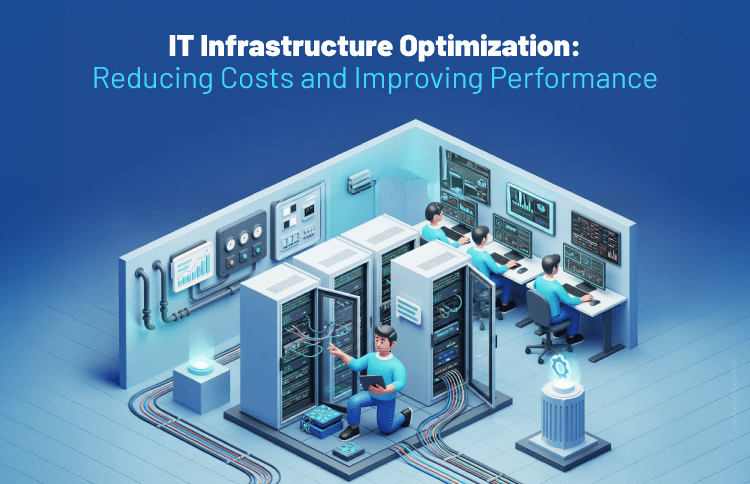PHP or Laravel: What to Choose for Your Web Application Development Project
Table of Contents
When it comes to web application development, choosing the right technology stack can significantly impact the success of your project. Two contenders that often dominate the discussion are PHP and Laravel. These back-end tech stacks offer unique advantages that cater to different project requirements and development preferences. If you are wondering which one to choose, read on.
Here, we’ll delve into the strengths, weaknesses, and nuances of PHP and Laravel, helping you decide which one aligns best with your web app aspirations.
Understanding PHP
PHP is a server-side scripting language that allows you to create dynamic and interactive websites. It is a free, open-source, general-purpose language embedding HTML code. PHP allows developers to develop web apps without relying on external libraries or frameworks that reduce the code and help complete the web application development process within the given time.
Key features
- Server-Side Scripting: Executes on the server to generate dynamic content for websites.
- Open Source: Freely available with the ability to modify and distribute.
- Database Support: Offers functions to interact with various databases for data management.
- Embeddable: PHP code can be seamlessly mixed with HTML code.
- Simple Syntax: Easy-to-learn syntax similar to C and Perl programming languages.
- Protocol Support: Supports diverse network protocols for various communication needs.
- Security Features: Provides tools for data validation and implementing security measures.
- Community & Documentation: Benefits from a large community and abundant online resources.
- Customizability: Allows developers to create tailored solutions using custom functions.
- Web Server Compatibility: PHP can be configured to work with different web servers for deployment.
Drawbacks
- Lack of Structure: PHP projects can need a standardized structure, leading to disorganized and hard-to-maintain code.
- Security Concerns: PHP development requires manual implementation of security measures. And it causes vulnerabilities in PHP if not handled properly.
- Maintenance Issues: Without a consistent framework, maintenance becomes challenging as codebase size and complexity increase.
- Limited Built-in Features: PHP lacks the built-in features and libraries that modern frameworks provide, requiring developers to code more functionalities.
- Code Duplication: The absence of reusable components can lead to code duplication across projects, making updates and bug fixes difficult.
Companies using PHP:
- Etsy
- WordPress
- Meta
- Wikipedia
- Slack
Understanding Laravel
There are several frameworks of PHP to choose from, and Laravel is one of them. It is a free and open-source PHP framework used for developing web apps. Laravel is based on Symfony and follows a Model-View-Controller (MVC) architectural pattern. It offers various tools and functionalities, including expressive migration systems, integrated unit testing, inverted control containers, etc., to streamline development and ensure feature-rich web apps.
Key features
- Eloquent ORM: Simplifies database interaction by providing a user-friendly syntax for managing database records.
- Routing and Controllers: Offers a powerful routing system that maps URLs to controller actions, enhancing appl organization.
- Blade Templating Engine: Allows developers to create dynamic, reusable templates and separates presentation from application logic.
- Middleware: Filters and processes HTTP requests before they reach application routes.
- Authentication and Authorization: Provides pre-built authentication scaffolding and role-based permissions for better user security.
- Artisan CLI: Offers a command-line interface with tools that automate code generation, database migration, and testing tasks.
- Migrations and Seeding: Facilitates database schema management and data seeding, aiding version control and test data setup.
- Testing: Integrates PHPUnit for efficient testing, ensuring application stability and preventing code regressions.
- Caching and Performance: Supports multiple caching mechanisms to optimize application speed and responsiveness.
- Vibrant Community: Benefits from an active community and ecosystem that contributes extensions and packages via Composer.
Drawbacks
- Performance Overhead: The abstraction and features in Laravel can introduce some performance overhead compared to simpler frameworks like PHP.
- Dependency on Composer: Laravel’s reliance on Composer for package management can lead to potential conflicts or versioning issues.
- Complexity for Small Projects: Laravel’s feature-rich nature can cause unnecessary complexity for smaller projects.
- Upgrade Challenges: Upgrading between Laravel versions can require effort to break changes and new features.
- Potential Over-Engineering: Overusing Laravel’s features in simple projects can result in over-engineering and bloated code.
- Locked into Ecosystem: Using Laravel’s ecosystem heavily can cause difficulty switching to a different framework or stack.
Companies using Laravel:
- Pfizer
- BBC
- Ratio
- Crowdcube
- TourRadar
PHP vs. Laravel: What Are the Differences?
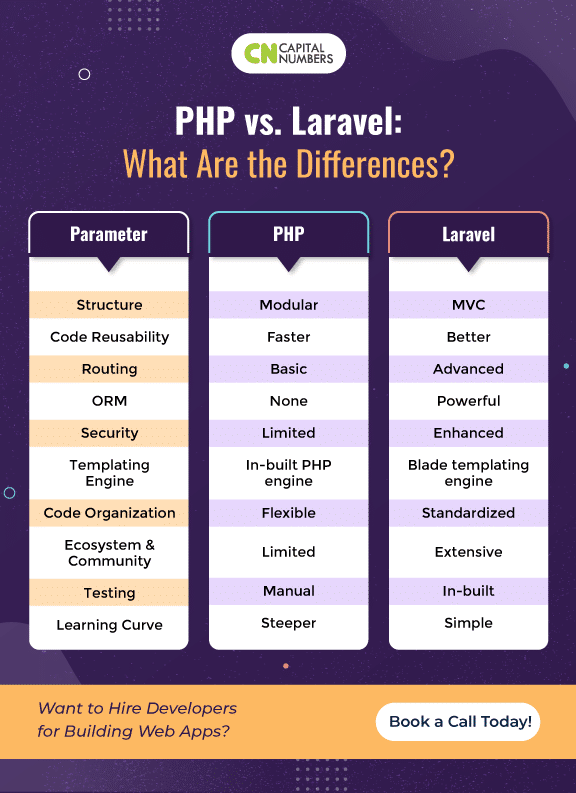
PHP vs. Laravel: In-Depth Comparison
1. Performance
Performance is one of the key parameters to consider when comparing tech stacks. The better the performance, the more effectively it analyzes the request processing attribute. When comparing PHP’s performance with Laravel, PHP is faster than Laravel for its high concurrency rate. This enables PHP to process and respond to several user requests concurrently.
For its framework structure, Laravel introduces a slight overhead. However, the performance impact could be more reasonable for most apps.
2. Architecture
When choosing a programming language and framework for developing a business solution, considering the architecture is essential for you. This can affect your web application’s speed and data security. PHP has a feature to extract the logic layer from the representation layer. It helps developers effortlessly configure the data routes for impeccably receiving and processing users’ data inputs.
On the other hand, Laravel uses a Model-View-Controller architecture that helps developers divide the software’s front-end and back-end. So, interface designers and back-end developers can work simultaneously and complete the app on time. Also, by offering better control to customize the website, the MVC architecture improves a website’s search engine ranking.
3. Speed
When developers write codes simply and clearly, PHP scripts can run quickly. Also, web developers can reuse the PHP scripts in related projects, speeding up your next task.
On the flip, the layered design of Laravel lows down the code execution. But it is a strength of Laravel as it offers more thorough debugging tools than PHP to assist the development team in writing workable code with only minor flaws. So, Laravel also ensures quick development.
So, when comparing the speed of both, we can deduce that PHP and Laravel can operate equally efficiently.
4. Scalability
A tech stack that can easily integrate new functionalities to extend an enterprise solution’s performance is the best choice. Both PHP and Laravel are continually upgraded with new components. And it leads to embedding Cloud Infrastructure with the app and offers the advantage of scaling up resources anytime with the increasing business needs.
However, PHP has features like autoloader and opcode cache for executing many user requests within seconds. Also, it does not compile code with every user request, enhancing your web application’s speed in shared storage.
5. Security
Safeguarding data in the database and ensuring secure transmission are vital tasks for any company. Even a small breach could result in significant losses. When you compare PHP and Laravel based on providing data integrity and confidentiality, Laravel is considered more secure for its well-grounded structure. And this is one of the reasons for choosing Laravel for enterprise solutions. To prevent unauthorized access and cyber threats to PHP-based applications, developers should adjoin third-party APIs and define their protocols.
However, Laravel has a built-in security system for mitigating SQL injection and cross-site request forgery attacks. Also, access control and authentication systems are, by default, enabled to cross-verify user identity and allow legitimate users to access resources.
6. Compatibility with Database
Databases are crucial for any application for organizing, storing, and processing data per user request. Currently, Laravel supports four databases, including SQL, MySQL, SQLite, and Postgres. It helps establish various connections between web apps and different databases and ensures a seamless communication path.
However, you can link PHP with any database, such as IBM-DB2, MySQL, Oracle, MongoDB, etc. Also, for its incorporated modules and functions, switching from one database to another is easy. It assists experts in migrating user data through minimal coding through API reusability, OOPS-based syntax, prepared statement support, and exception handling.
7. Resource Availability
Before creating an app and using any tech stack, one should consider market research to understand hardware’, software’, and human resources’ accessibility and affordability. With strong community support for both the back-end tech stacks, it is easy to hire PHP developers or Laravel experts as per your needs and speed up your project.
Besides, when working on tech stacks, developers hardly require expensive hardware assets to compile and run the code on a machine. Developing software with these two technologies is cost-efficient and less time-consuming, so beneficial for you.
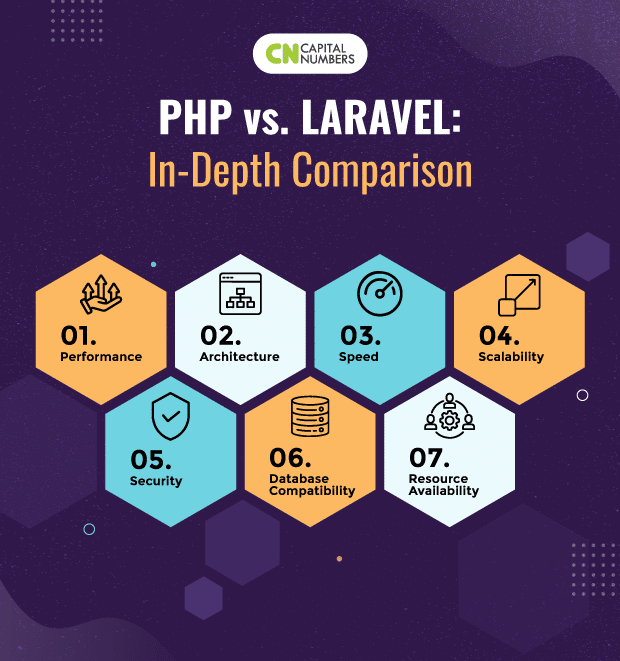
You may also read: Hiring In-House PHP developers vs. Hiring PHP Developer in India: the REAL Cost
Similarities between PHP and Laravel
Despite several differences between PHP and Laravel, there are some similarities. Let’s explore them –
• Server-side Scripting
Both PHP and Laravel are used for server-side scripting. It means they are used to build the back-end logic of web applications.
• MVC Architecture
Laravel follows the Model-View-Controller (MVC) architectural pattern. It is a way of organizing code in a structured manner. PHP doesn’t enforce MVC by default. But developers can also implement MVC architecture manually when using PHP.
• Database Interaction
Both frameworks allow you to interact with databases easily. They support various database systems. Also, they provide mechanisms for executing queries, retrieving data, and managing databases.
• Template Engine
Both frameworks support template engines for separating HTML and presentation logic. Laravel uses Blade as its template engine, while PHP developers often use PHP itself for rendering templates.
• RESTful API Development
PHP and Laravel can be used to develop RESTful APIs (Application Programming Interfaces) for building web services that interact with other applications.
Although there are these similarities, Laravel provides a more comprehensive and structured approach to web development compared to PHP, which gives developers tools and patterns to streamline development processes.
Bottom Line
Choosing between PHP and Laravel is not a matter of one being universally superior to the other. Instead, the decision depends on your project’s complexity, scalability needs, and developers’ expertise. PHP’s simplicity and flexibility suit smaller projects and experienced developers who prefer more control over their code. On the other hand, Laravel’s powerful features and structured approach cater to larger applications, teams, and those who value rapid development.
Before choosing a web app development tech stack, carefully assess your project’s scope, timeline, and long-term goals. Keep in mind that both PHP and Laravel have their place in the web development ecosystem. Your decision should reflect your app’s needs.
And if you are looking for PHP or Laravel development services, choose an award-winning software solutions company like Capital Numbers. Considering your business needs, we will offer you the best solution possible.
Want to discuss your project? Call us today!

